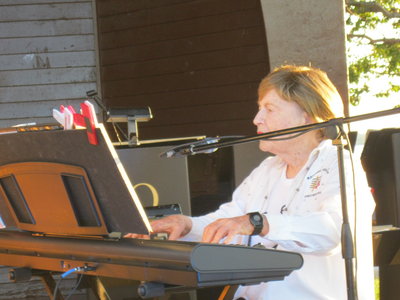Wanted: musicians who can perform with an ensemble to play swing jazz from the ‘30s, ‘40s, and ‘50s, and do not live too far from Bayonne to attend the Tuesday morning rehearsals. Although these positions are for the Bayonne Senior Orchestra, gray hair is not required.
“We’ll take anyone who can play with other musicians,” said June Sturz, pianist and singer, who has been with the orchestra for more than 20 years. But on a warm evening in August, she was nervous as the remaining five members got ready to perform at the city’s Sounds by the Bay series.
Rained out from the previously scheduled appearance, the orchestra was opening the night for about 150 people scattered across the park, most seated in lawn chairs, the sun setting over Port Newark’s large cargo cranes while a nearly full moon rose up over the eastern side of Bayonne.
“I’m a little nervous,” Sturz said. “This is the first time we’re going on without our horn section.”
The orchestra is down to five members and would like to bolster its ranks again.
“We used to have 10,” Sturz said.
Performances vary, but often take place in the city’s senior centers and sometimes in senior buildings, or in the park on a summer night. The next performance is scheduled for Oct. 29 at the Fourth Street Senior Center, but Sturz would like to increase the membership before then.
“We don’t discriminate. We take young people,” she said.
Sturz joined the orchestra in the autumn of 1991, when the group was six years old. For many senior citizens, the orchestra has become a central part of their lives and a nostalgic connection to a musical past largely ignored by modern media. It helps that members of the orchestra are also senior citizens who happened to be accomplished musicians with years of playing on the stage.
“This is the first time we’re going on without our horn section.” – June Sturz
__________
Time takes its toll
Unfortunately, age often reduces the number of performers. People pass away or retire out of town or just do not wish to play any more, and the orchestra needs to find new people to fill in.
When Sturz joined, Charlie Oliver was leader, and when he became ill, Sturz took his place.
Sturz started with the orchestra as a singer, although she had had plenty of experience as a pianist over the years. She describes herself as a jazz pianist, not one who plays note for note.
Sturz became the pianist when the orchestra’s pianist stepped out to use the toilet and she was asked to fill in.
“When he came back and heard me, he left and never came back,” she said.
The orchestra draws most of their material from “The Great American Songbook.” This is an informal name to describe a period of popular music that took place between the 1930s and 1950s that many consider the peak of writing for popular music. This includes composers like Cole Porter, George and Ira Gershwin, Irving Berlin, Rodgers and Hart, and Duke Ellington. The songs usually feature strong melodies, well-thought-out lyrics, and sophisticated rhythms. The orchestra does occasionally play some contemporary tunes.
On this night, some of the tunes on the bill of fair include “Pennies from Heaven,” “Making Whoopee” and “Apples, Peaches, Pumpkin Pie.”
Sturz said she sometimes sings with a Grammy-winning ensemble at the Hotel Edison in New York City, and recently sang “Making Whoopee” only to learn Cole Porter’s daughter was in the audience at the time.
The orchestra performs a lot of gigs during the year, especially during the holidays, and usually rehearses at the old St. Andrew’s Hall on West Fourth Street.
“We play at the library when we’re invited, at the senior centers, and private senior clubs,” she said. “We’re always looking for new members.”
